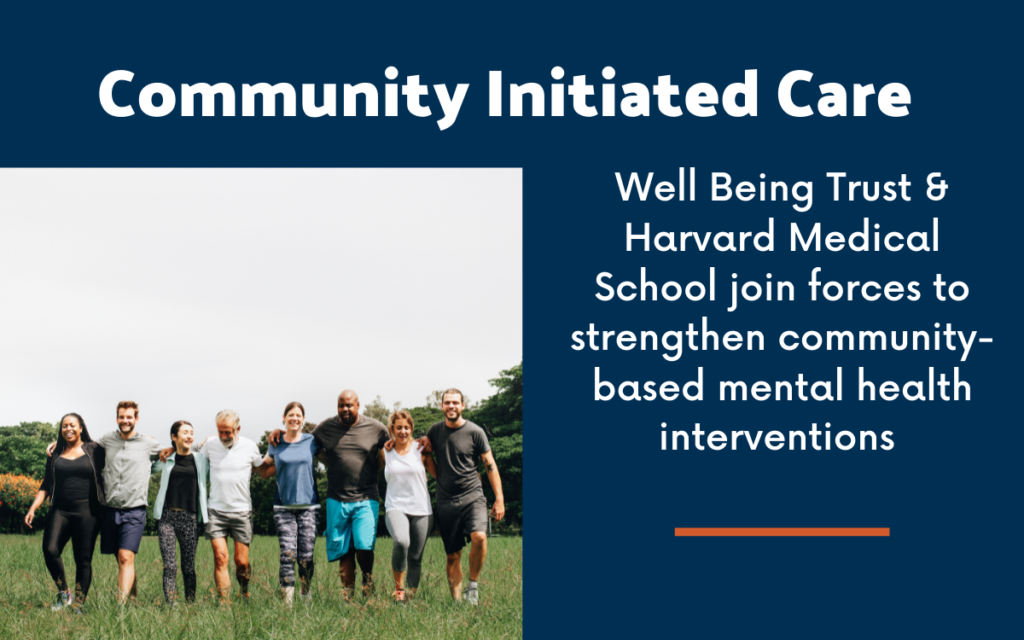“ We need to think about a new strategy for addressing community needs, a new workforce that can emerge deep in community, by community,
and for community.” – Dr. Benjamin Miller, President, Well Being Trust
The mental health system in the United States has traditionally been fragmented, overburdened, and underfunded. A variety of supply and demand-side barriers, ranging from inequitable access and cost to stigma related to mental health and substance use issues, contribute to the growing and unmet need for mental health care. The massive impact of this unmet need is evidenced by the following:
- Between 2010 and 2019, more than one million Americans died from alcohol, drugs, and suicide.
- One person dies of a drug overdose, suicide, or alcohol abuse every 3.5 minutes.
- 33% of those seeking care wait more than a week to access a mental health clinician.
- 50% drive more than one-hour round trip to mental health treatment locations.
- 50% of counties in the U.S. have no psychiatrist.
- Only 10% of psychiatrists and 16% of psychologists currently practicing are from minority groups.
- Only 10% with an identified substance use disorder (SUD) receive treatment.
COVID-19 has compounded mental health-related suffering and inequities, with half the country stating that the pandemic has had a negative effect on their mental health. The mental health burden continues to be inequitably distributed across age, gender, race, location, and social class. Historically disadvantaged communities remain disproportionately affected. Mental health care is typically contingent on diagnosis and, unlike physical health, there is very little focus on prevention and early intervention. Our mental health system was not designed to address the unmet needs in the U.S. before the pandemic; it will be even more ill-equipped to address the rising mental health needs after the pandemic. Our current solutions, including the health system and our licensed workforce, are incapable of meeting the overall community demand.
A Solution
CIC should be understood as a broadly inclusive concept of democratizing and empowering individuals to learn how to respond to mental health and addiction issues and take helpful action in the moment. Specifically, effective CIC efforts involve training and supporting community members to ensure that they acquire the knowledge, skills, and competencies necessary to deliver high quality evidence-informed programs for prevention and early intervention of mental health concerns. Though each of the following layers of care have distinct components, certain knowledge and skills overlap all three:
- Self-care, with or without guidance, entails offering skills to everyone in the community, with a particular emphasis on settings like educational institutions and work places;
- Mental health promotion and prevention interventions which can be delivered by persons who are already engaged in activities within community-based settings and therefore place them in a unique position to provide these interventions;
- Low-intensity psychosocial interventions delivered to people with mental health distress/disorders, by those specifically employed as community-based health care providers.
Through the task-sharing approach, mental health promotion, prevention, and low-intensity interventions can be delivered by a range of both “lay” members of the community and professionals, including but not limited to: barbers and beauticians, teachers, faith-based and spiritual leaders, community health workers, peer support specialists, first responders, safety net providers, and many others regularly engaged in community settings.
Proposed Pathway
To provide immediate support for mental health needs and reduce mental health-related suffering, we must build sustainable and affordable resources and capacity in the community to promote mental health and well-being, prevent mental health concerns, and support the recovery of persons who are affected by mental health conditions.
To address this challenge, Well Being Trust is working with Harvard Medical School to develop a national plan for scaling up community-based models of care that enable and empower individuals in communities to learn how to prevent and respond in a timely and effective manner to mental health and substance use concerns. The Community Initiated Care effort is intended to promote population mental health and well-being, reduce historic and emerging disparities, prevent mental health issues through scaling up evidence-based interventions, and build a new type of mental health workforce in communities throughout the United States.
Resources
Enhancing the Capacity of the Mental Health and Addiction Workforce: A Framework
Making It Easy to Get Mental Health Care: Examples from Abroad
We Heal One Another
The mhGAP Community Toolkit
Reports
New Directions for the Mental Health Workforce Globally Summary and Recommendations
Full Report: New Directions for the Mental Health Workforce Globally
Presentations
Rethinking Workforce
Watch Video – ThinkBigger, DoGood Policy Series – Enhancing the Capacity of the Mental Health and Addiction Workforce: A Framework
FAQs
View Community Initiated Care FAQs







